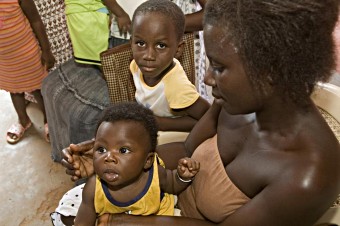
Geneva, 10 June 2011 - A record 50 GAVI eligible countries have applied for vaccine funding from the GAVI Alliance during the organisation's latest application round, reported GAVI officials today. The number of countries is nearly double the previous record in 2007 when 27 countries requested support to introduce new or underused vaccines.
The increased demand highlights how developing countries are increasingly prepared to expand routine immunisation programmes and introduce new vaccines to save the lives of children and protect against illness and disability.
Countries were able to apply for GAVI support for the introduction of pneumococcal, rotavirus, pentavalent, meningitis A, yellow fever, or measles second dose vaccines.
Of the 75 funding applications that were submitted, the majority were for two vaccines that protect against the biggest causes of pneumonia and diarrhoea. Every year, pneumonia and rotavirus diarrhoea kill more than one million children under the age of five, making them by far the biggest killers of children.
"If we are able to fully fund these applications and support countries in the battle to fight these two killers, we can make a serious and positive impact on the lives of millions of children," said Helen Evans, GAVI's interim CEO.
GAVI had previously approved financial support for the introduction of pneumococcal and rotavirus vaccines in 19 and 5 countries respectively. The Alliance's first pledging conference on 13 June aims to raise the necessary funds required by countries and to fulfill its ambitious goal of immunising nearly a quarter billion children by 2015.
As part of their application, countries must commit to co-finance the purchase of the vaccines, and more and more countries are responding positively. In 2010, ten countries paid more than required and GAVI expects co-financing to triple from current levels to a total US$ 100 million in 2015.
"The evident commitment from developing countries to step up introduction of vaccines, combined with strong donor support, will take us further down the road towards achieving the child survival goals," said Margaret Chan, Director-General of the World Health Organization. "Every child deserves protection with the best that science can offer," she said.
The largest applications come from Ghana and Haiti, which have applied for four and three vaccines respectively. GAVI has also received applications from Somalia and Afghanistan, while Timor Leste made its first application since becoming independent in 2002.
Four countries - Benin, Ghana, Senegal, and Sudan - applied for support with a new vaccine against meningitis A, MenAfriVac. They join six countries already approved for introduction since the launch in December of the vaccine in Burkina Faso, Chad, and Niger.
An independent expert committee will review applications and make recommendations for funding to the GAVI Board, based on the strength of the implementation plan.

Geneva, 10 June 2011 - A record 50 GAVI eligible countries have applied for vaccine funding from the GAVI Alliance during the organisation's latest application round, reported GAVI officials today. The number of countries is nearly double the previous record in 2007 when 27 countries requested support to introduce new or underused vaccines.
The increased demand highlights how developing countries are increasingly prepared to expand routine immunisation programmes and introduce new vaccines to save the lives of children and protect against illness and disability.
Countries were able to apply for GAVI support for the introduction of pneumococcal, rotavirus, pentavalent, meningitis A, yellow fever, or measles second dose vaccines.
Of the 75 funding applications that were submitted, the majority were for two vaccines that protect against the biggest causes of pneumonia and diarrhoea. Every year, pneumonia and rotavirus diarrhoea kill more than one million children under the age of five, making them by far the biggest killers of children.
"If we are able to fully fund these applications and support countries in the battle to fight these two killers, we can make a serious and positive impact on the lives of millions of children," said Helen Evans, GAVI's interim CEO.
GAVI had previously approved financial support for the introduction of pneumococcal and rotavirus vaccines in 19 and 5 countries respectively. The Alliance's first pledging conference on 13 June aims to raise the necessary funds required by countries and to fulfill its ambitious goal of immunising nearly a quarter billion children by 2015.
As part of their application, countries must commit to co-finance the purchase of the vaccines, and more and more countries are responding positively. In 2010, ten countries paid more than required and GAVI expects co-financing to triple from current levels to a total US$ 100 million in 2015.
"The evident commitment from developing countries to step up introduction of vaccines, combined with strong donor support, will take us further down the road towards achieving the child survival goals," said Margaret Chan, Director-General of the World Health Organization. "Every child deserves protection with the best that science can offer," she said.
The largest applications come from Ghana and Haiti, which have applied for four and three vaccines respectively. GAVI has also received applications from Somalia and Afghanistan, while Timor Leste made its first application since becoming independent in 2002.
Four countries - Benin, Ghana, Senegal, and Sudan - applied for support with a new vaccine against meningitis A, MenAfriVac. They join six countries already approved for introduction since the launch in December of the vaccine in Burkina Faso, Chad, and Niger.
An independent expert committee will review applications and make recommendations for funding to the GAVI Board, based on the strength of the implementation plan.
